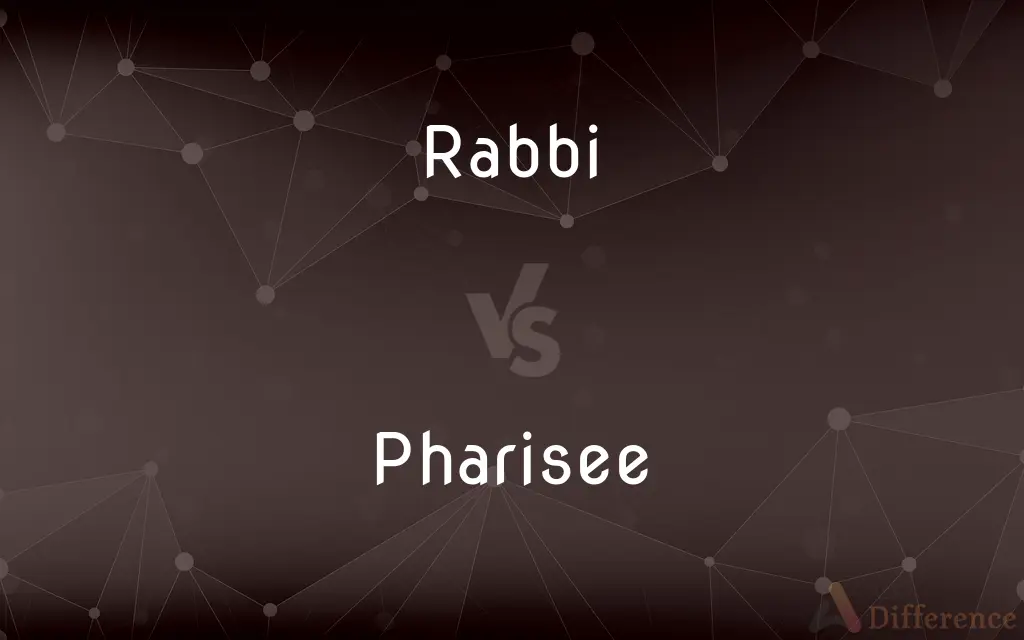Rabbi vs. Pharisee — What's the Difference?
By Tayyaba Rehman & Urooj Arif — Updated on April 6, 2024
A Rabbi is a Jewish religious teacher and leader, while a Pharisee was a member of an ancient Jewish sect known for strict observance of the law.

Difference Between Rabbi and Pharisee
Table of Contents
ADVERTISEMENT
Key Differences
Rabbis are central figures in Judaism, focusing on teaching, interpreting the Torah, and leading community worship. They serve as spiritual leaders and guides in contemporary Jewish communities. On the other hand, Pharisees were a prominent Jewish group during the Second Temple period, known for their emphasis on the Oral Torah and traditions alongside the written law. Their influence waned after the destruction of the Second Temple in 70 CE, but their interpretations laid the groundwork for Rabbinic Judaism.
Rabbis are ordained through a formal educational process, culminating in semicha (ordination), which empowers them to make legal decisions within Jewish law. Whereas Pharisees were not formally ordained but were recognized for their scholarly and pious adherence to Jewish law and traditions, often engaging in debates with other groups like the Sadducees.
The role of a Rabbi is inherently communal, often involving leading prayers, conducting life cycle events, and providing pastoral care. Pharisees, while also community-oriented, were more focused on interpreting Jewish law and living according to its dictates, emphasizing purity laws and the importance of the Oral Torah.
Rabbis draw upon a vast body of rabbinic literature, including the Talmud and later commentaries, for their teachings and decisions. Pharisees, however, relied on their interpretations of the Torah and the traditions that they believed had been handed down from Moses in addition to the written law.
Comparison Chart
Definition
Jewish religious leader and teacher
Member of an ancient Jewish sect
ADVERTISEMENT
Main Focus
Teaching Torah, leading worship, community leadership
Strict observance of the law, both written and oral
Period of Influence
Contemporary, ongoing
Second Temple period, influence declined post 70 CE
Ordination/Education
Formal education and semicha (ordination)
Recognition for scholarship and piety, no formal ordination
Key Activities
Leading prayers, life cycle events, pastoral care
Debating law, emphasizing purity laws and traditions
Compare with Definitions
Rabbi
The title for someone authorized to make legal decisions in Jewish law.
The rabbi issued a halachic ruling on the matter.
Pharisee
A person advocating for the oral tradition alongside the Torah.
Pharisees debated interpretations of the law passionately.
Rabbi
A Jewish teacher of the Torah.
The rabbi's interpretation of the scripture was enlightening.
Pharisee
A figure often in conflict with Jesus in the New Testament.
Pharisees questioned Jesus’ teachings and actions.
Rabbi
An ordained leader in a Jewish community.
Our rabbi led the prayer services during the High Holidays.
Pharisee
A member of an ancient Jewish sect known for strict legalism.
The Pharisee meticulously followed every law.
Rabbi
A spiritual counselor in Judaism.
She sought the rabbi's advice for her family issues.
Pharisee
Someone belonging to a group influential in Judaism before 70 CE.
The Pharisees had significant influence in the Sanhedrin.
Rabbi
A guide for personal and communal Jewish practices.
The rabbi organized community service activities for the congregation.
Pharisee
A participant in Jewish religious life focused on purity laws.
The Pharisee observed dietary laws strictly.
Rabbi
A rabbi is a spiritual leader or religious teacher in Judaism. One becomes a rabbi by being ordained by another rabbi, following a course of study of Jewish texts such as the Talmud.
Pharisee
Pharisee A member of an ancient Jewish sect that emphasized strict interpretation and observance of the Mosaic law in both its oral and written form.
Rabbi
Abbr. R. A person trained in Jewish law, ritual, and tradition and ordained for leadership of a Jewish congregation, especially one serving as chief religious official of a synagogue.
Pharisee
A hypocritically self-righteous person.
Rabbi
A scholar qualified to interpret Jewish law.
Pharisee
One of a sect or party among the Jews, noted for a strict and formal observance of rites and ceremonies and of the traditions of the elders, and whose pretensions to superior sanctity led them to separate themselves from the other Jews.
Rabbi
A Jewish scholar or teacher of halacha (Jewish law), capable of making halachic decisions.
Pharisee
A self-righteous or sanctimonious person
Rabbi
A Jew who is or is qualified to be the leader of a Jewish congregation.
Pharisee
A member of an ancient Jewish sect noted for strict obedience to Jewish traditions
Rabbi
A senior officer who acts as a mentor.
Rabbi
Master; lord; teacher; - a Jewish title of respect or honor for a teacher or doctor of the law.
Be not ye called Rabbi, for one is your Master, even Christ, and all ye are brethren.
Rabbi
Spiritual leader of a Jewish congregation; qualified to expound and apply Jewish law
Rabbi
A Hebrew title of respect for a Jewish scholar or teacher
Common Curiosities
Did Pharisees have any specific roles?
Pharisees were scholars and pious individuals focused on interpreting Jewish law, emphasizing purity laws and traditions.
What is a Rabbi?
A Rabbi is a Jewish religious leader and teacher, often involved in teaching Torah, leading worship, and providing spiritual and pastoral guidance.
Are there any Rabbis today?
Yes, Rabbis continue to serve as spiritual leaders, teachers, and legal authorities in Jewish communities worldwide.
Did the Pharisees have any written texts?
While Pharisees emphasized oral traditions, their interpretations influenced the Mishnah, a key text in Rabbinic Judaism.
What is the difference between a Rabbi and a Cantor?
A Rabbi focuses on teaching and spiritual leadership, whereas a Cantor specializes in leading musical aspects of Jewish worship.
Who were the Pharisees?
The Pharisees were a Jewish sect during the Second Temple period known for their strict observance of the law and emphasis on oral traditions.
How does one become a Rabbi?
Becoming a Rabbi typically involves years of study in Jewish texts and law, culminating in an ordination (semicha).
Were Pharisees opposed to Jesus?
In the New Testament, Pharisees are often depicted as adversaries of Jesus, challenging his teachings and authority.
Can women become Rabbis?
In many branches of Judaism, including Reform, Conservative, and Reconstructionist, women can and do become Rabbis.
Is the role of a Rabbi limited to religious functions?
While primarily religious, Rabbis often engage in social and communal leadership, education, and activism.
What distinguishes a Rabbi's teaching from a Pharisee's?
A Rabbi's teachings draw on a broader range of Rabbinic literature and contemporary issues, while Pharisee teachings were more focused on their specific interpretations of the law and traditions.
How did Pharisees view the Oral Torah?
Pharisees held the Oral Torah in high regard, considering it an essential complement to the Written Torah for understanding and practicing Jewish law.
How do contemporary Jewish communities view Pharisees?
Contemporary views are complex; while some see them as forebears of Rabbinic Judaism, others view them through the critical lens of New Testament narratives.
Did Pharisees contribute to modern Judaism?
Pharisaic interpretations and emphasis on the Oral Torah significantly influenced Rabbinic Judaism, shaping much of modern Jewish practice.
Do Rabbis have any authority outside their community?
Rabbis' authority is primarily within their own communities, though their decisions and teachings can influence broader Jewish thought.
Share Your Discovery

Previous Comparison
Interdependent vs. Interrelated
Next Comparison
Privy vs. PrivateAuthor Spotlight
Written by
Tayyaba RehmanTayyaba Rehman is a distinguished writer, currently serving as a primary contributor to askdifference.com. As a researcher in semantics and etymology, Tayyaba's passion for the complexity of languages and their distinctions has found a perfect home on the platform. Tayyaba delves into the intricacies of language, distinguishing between commonly confused words and phrases, thereby providing clarity for readers worldwide.
Co-written by
Urooj ArifUrooj is a skilled content writer at Ask Difference, known for her exceptional ability to simplify complex topics into engaging and informative content. With a passion for research and a flair for clear, concise writing, she consistently delivers articles that resonate with our diverse audience.















































